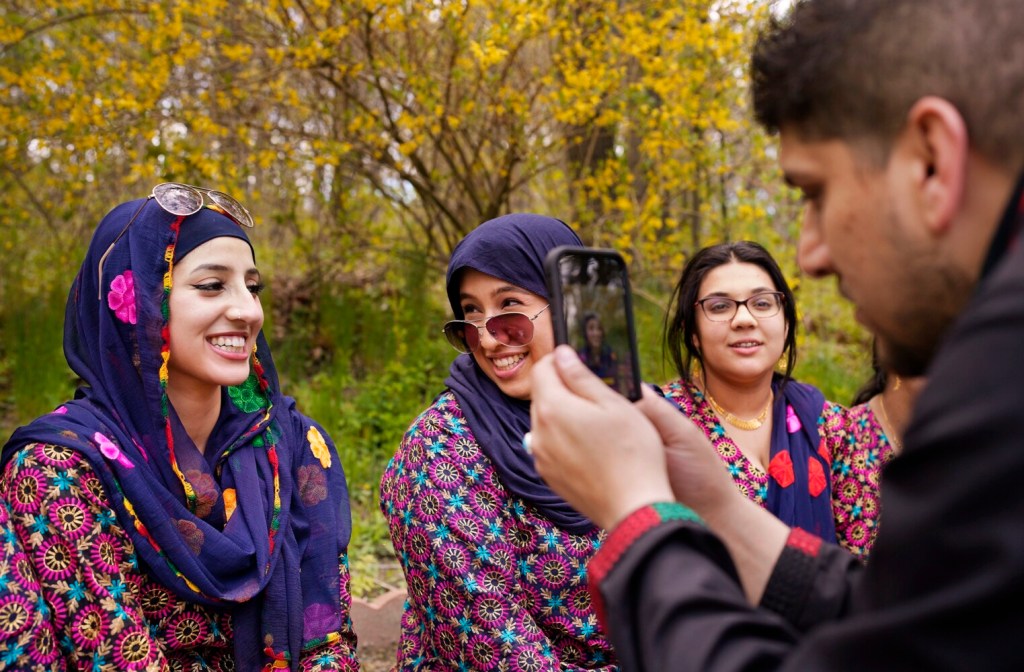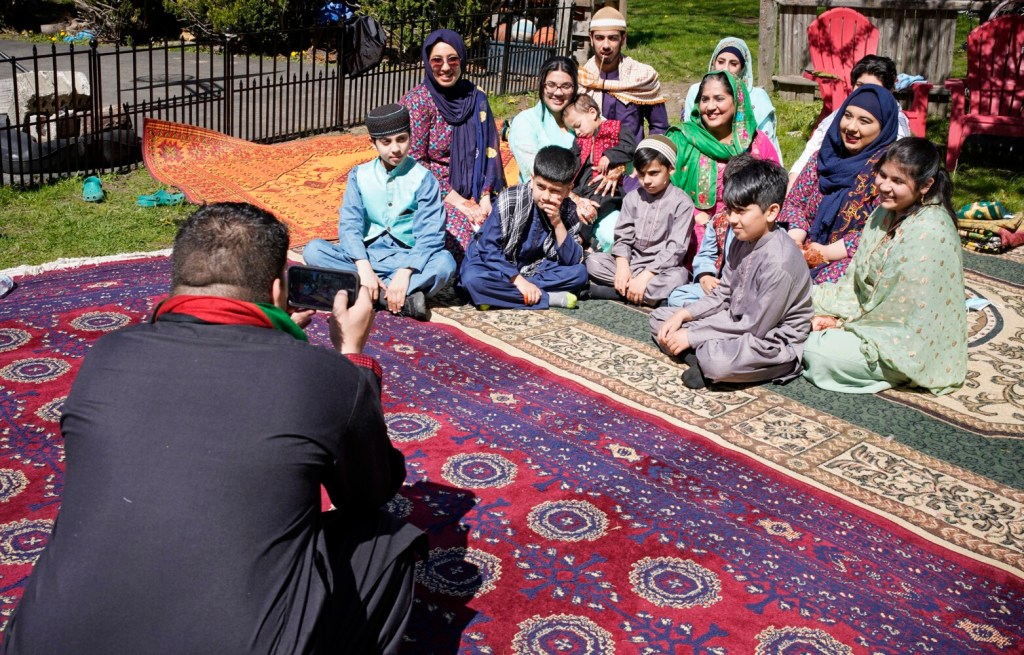CAPE ELIZABETH — More than 40 years ago, Now Shir fled Afghanistan and came to Maine, escaping poverty and oppression and the threat of advancing Soviet troops.
Shir hoped to make a better life for his young family, something he had been dreaming about since he was in high school and saw a postcard of New York City, with its sparkling skyscrapers and promise of opportunity and advancement in exchange for hard work.

Her hand decorated with an ornate henna design, Saleema Shir, 18, adjusts her head scarf while posing for photos with other family members during Thursday’s celebration inCape Elizabeth. Gregory Rec/Staff Photographer
On Thursday morning, in a tree-lined backyard in this prosperous seaside town, where Shir’s four children now own homes and are raising families of their own, his second-oldest grandson led three generations in prayers for Eid al-Fitr, the Muslim holiday celebrating the end of Ramadan.
Shir, now 72, coached his grandson, Sulayman Shir, moments before 25 family members kneeled together on large carpets spread on the grass and faced southeast toward Mecca, in Saudi Arabia, birthplace of the Islamic prophet Muhammed.
“I had to prepare with my grandfather,” said Sulayman Shir, 21, an X-ray technology student at Southern Maine Community College. “He taught me how to do the Takbir – when you repeat Allahu akbar, God is great – for Eid.”
When the prayers were finished, the family members stood and embraced one another. As the women’s laughter rose to meet the warm sunshine, Sulayman Shir faced Mecca once again and bowed his head. Palms turned to the sky, he thanked God for all the good things in his life and for giving him the grace to lead the prayer.
“It was my first time, so I was proud, and I was a little emotional,” he explained later.
Normally, the Shirs would have attended the communal Eid prayer that has been held for more than a decade at the Portland Expo or Fitzpatrick Stadium. But for the second year in a row, COVID-19 forced the imams, or leaders of Muslim communities in Maine, to cancel the annual celebration that usually attracts more than 5,000 followers of Islam.
With the pandemic preventing large community gatherings, Muslim families across Maine stayed home to celebrate the end of Ramadan, a monthlong fast when believers refrain from eating or drinking from sunrise to sunset and emphasize charitable giving and prayer in their daily lives. For the Shirs and others, Eid is a time to honor their faith and family bonds that often have survived wars, separation and great losses along the way.

Shukria Wiar hugs her nephew Sulayman Shir after prayers during their Eid al-Fitr celebration. Gregory Rec/Staff Photographer
And so the Shirs organized a daylong backyard gathering made easier because nearly all but the youngest family members have been vaccinated. It began with prayers and late morning tea served with dates and other sweets. A noontime feast included Afghan specialties such as beef kabobs and spicy rice with chicken, and Domino’s pizza.
All wore traditional Afghan pants and tunics called shalwar kameez, the men mostly in plain white, the women’s outfits brightly colored with coordinating hijabs, or head scarves. Music played, everyone danced, adults gave crisp dollar bills to children and many called family and friends in Afghanistan and throughout Europe to wish them Eid Mubarak, or Blessed Eid.
“I thank God my children and grandchildren are safe,” said Sadri Shir, 70, Now Shir’s wife, sitting at the edge of the fenced-in yard watching her youngest grandchildren play.
Now Shir settled in Portland in 1983 and Sadri Shir joined him a year later with their two sons and a daughter. They soon had another son. One of eight children, Now Shir was a police officer in Afghanistan and his father was a long-distance truck driver.
Once in Maine, Now Shir often worked three minimum-wage jobs at a time, earning about $35,000 a year through the 1980s. Two of their children, Nasir Shir and Shukria Wiar, attended the independent Waynflete School in Portland on full scholarships and went on to graduate with advanced college degrees.
Nasir Shir is a cartographer who specializes in GPS technology, a skill that led him to work in Afghanistan and the Middle East for about a decade, when he moved his family to Dubai. Wiar is a city planner in Portland, and other family members include a certified nursing assistant, a seamstress and a training coordinator at the Portland International Jetport.
“I’m so proud of my family,” Now Shir said. “It was my dream to come to America, but I thought, ‘Never mind,’ because we were so poor.”
The America that Now Shir and his family experience today is much different from the one that greeted him in the 1980s. Back then, he felt appreciated for his contribution in the Afghan war against the Soviet Union. That changed after the September 11 terrorist attacks, he said, and more recently with the anti-immigrant sentiment stirred up by former President Donald Trump. The situation was complicated further when the United States struck a deal last year with the Taliban to leave Afghanistan after 19 years.

Now Shir, patriarch of the Shir family, watches from a screen house while his extended family celebrates Eid al-Fitr in their backyard in Cape Elizabeth on Thursday. Gregory Rec/Staff Photographer
“We were heroes and now we’re zeros,” Now Shir said, describing how he believes some people view Afghan Americans.
Many of the Shirs have experienced racism and bigotry in Maine. They’ve been told they should be deported, including family members who were born here, and they’ve been called terrorists, though they actively work to promote peace and understanding.
“I love contributing to the community, so I volunteer a lot,” said Nasir Shir, who has served on the Cape Elizabeth School Board and is a member of the board of visitors at the University of Southern Maine.
When some of their children were harassed by fellow students because of their background, Nasir Shir and Shukria Wiar worked with school officials and community members to establish the Cape Diversity Coalition.
“The goal is to educate people about minority populations of all kinds,” Wiar said, including race, gender and other issues. “It’s hard to hate people once you get to know them. America isn’t a melting pot, but it is a diverse country built in large part by immigrants.”
Wiar believes things are getting better, she said, in the wake of dissent that was sown by the Trump administration, and with the awareness that has grown from the #MeToo movement and Black Lives Matter marches.
“We love America,” Wiar said, her bare feet on soft green grass. “It’s our country. We’re thankful we’re here and we’re free to practice our faith and celebrate with our families.”
Comments are not available on this story.
Send questions/comments to the editors.









